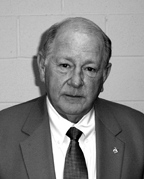 | Steve Shaffer served in the U.S. Army from 1964 – 1966. After serving his country Steve continued giving back by serving as a Law Enforcement Officer for 25 years, retiring in 1992. While working as a Law Enforcement Officer Steve continued his education at WSU where he earned a Masters Degree in 1975. He has attended numerous workshops relating to Anger Management, Domestic Violence, Psychotherapy, Addictions Counseling, and with Ethics and Professional Development. Steve worked in addiction counseling for the past 6 years. In 2003 Steve started his own drug & alcohol outpatient treatment program, called A New Dimension you may visit him at 2422 S. Seneca Ste. A or he can reach by calling 265-8600 |
Rehabilitation and Therapy
2007-04-01 16:32:00
Obstacles with chemical dependency
What are some of the biggest obstacles to overcome when dealing with Chemical Dependency?
ANSWER:
THE REALITY
The reality is that a person active in their addiction is dying of a disease that is chronic, progressive, fatal, incurable, and, if left untreated, that can result in premature death. This disease is called Chemical Dependence.
OVERCOMING DENIAL
Without a doubt the greatest obstacle in the treatment process for the chemically dependent person is denial. And one of the strongest and most effective tools to overcome denial is through an intervention process. Most interventions start with family members, friends, employers, or a significant other. Using a specialist, and the tools given, people can learn how to deal with the person and the disease by breaking through the denial. Again this is the largest obstacle to overcome with a person still active in their addiction. Working together, a counselor and the significant others can help the dependent person view his or her illness through the devastating effects it is having on others. It is then that a decision is usually made to seek treatment. The intervention process works. Most chemically dependent people, who undergo intervention, make the decision to enter treatment. That is their first step toward recovery.
THE PROCESS
Studies show that an intervention process is extremely successful when using love and compassion to confront the alcohol or drug dependent individual on their disease. Family members, or significant others that have an influence on the dependent's life, and a Counselor, gather together and present facts related to the chemically dependent's problem and consequences. The process of intervention is designed to smash through the dependent's rigid denial defense mechanisms and break through to reality. In most cases a person that is active in their addiction is not rational, and in most cases, substance abusers are unaware of the extent to which they have lost control.
This process, although the most important can be very demanding. It can be very painful and, at times, exasperating to deal with a loved one who is abusing alcohol or drugs. While we know them to be good people, we sometimes feel shame when considering their actions. This is the disease of addiction. A well planned intervention in the life of a substance abuser carried out by a loving, caring family and facilitated by an experienced counselor can help eliminate some of the suffering for all that are involved.
Chemical dependency is extremely difficult to deal with, and can not be ignored. Remember it is a disease that is chronic, progressive, and if left untreated will result in death!


